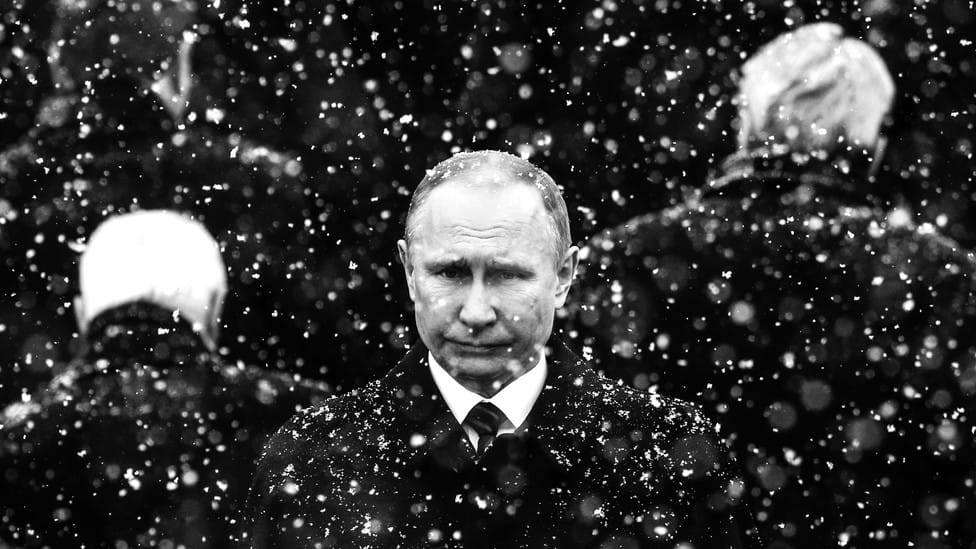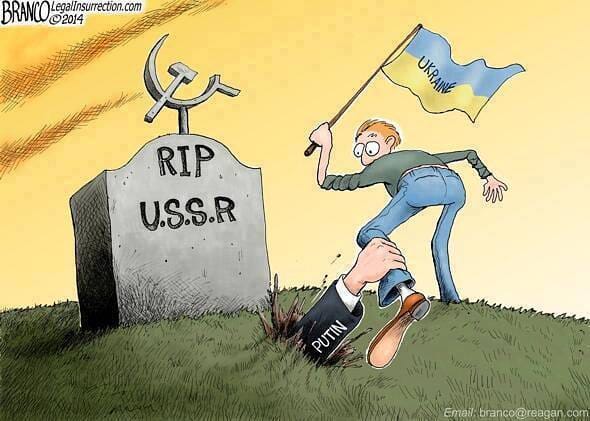
The crisis in Ukraine is turning into a crisis in Russia
Putin is in a zugzwang situation: he must decide whether to attack Ukraine or withdraw troops. Both carry great risks
12 February 2022
Russia first gathered troops on Ukraine's borders, then made demands on the United States and NATO. In other words, it supported its diplomacy with a show of force. The demonstration was aimed primarily at Western decision-makers and public opinion in order to achieve results.
Russia has long observed that the unity of the Western bloc has been disrupted and that continental Europe is moving away from America, a leadership crisis in the West, that the parties, which are the two main pillars of the US political system, are more involved in internal calculations, even that a democratic president is too weak to pass critical legislation initiatives from a Democrat-dominated Congress. Russia itself has not been idle in the past and has created various support groups (agents, influential agents, sincere believers, etc.) in the political, academic and media circles of the West. These groups were able to form a broad circle, believing in this idea, in their communities by consistently propagandizing the need to respect Russia's national interests. Even many skeptics of Putin's regime say the annexation of Crimea must be reconciled as an unchanging reality, that the conflict in eastern Ukraine should be resolved by mutual concessions, and have called for Ukraine's "Finnishization" (non-alignment to blocs and consideration of Moscow's interests in foreign and security policy). It was also taken into account that Western societies did not want war under any circumstances and were very afraid of this possibility, so they would put pressure on their governments to pay attention to Russia's demands. Why Ukraine is important and why relations with Russia have cooled because of it was not understood and supported at the public level in Europe and the United States.
Moscow thought on such a favorable ground there was a good chance that even if not all of its demands, but at least the part about the post-Soviet space would be accepted, and that this area would be recognized as an exclusive, legitimate area of interest of the Russian state. For this, the West will put pressure on Zelensky, forcing him to accept Russia's terms of peace.
In short, the Kremlin has acted on the principle that "opportunity is opportunity"/ “this is a good opportunity”. But was a mistake made in the analysis and forecasting? The process is not over yet, but it seems so.

The Biden administration was able to consolidate the entire West on this issue in a very short time. The concept of "collective West", which Russian propaganda likes to repeat, did not exist in practice, but now it does. (Of course, these states will always have different interests, but unity and a common policy are important in strategic matters.) The United States and the European Union have agreed on a real package of sanctions, unlike previous hollow ones against Russia. The United States and NATO are not leaving Eastern Europe, but are strengthening their positions there by sending additional forces. For the first time since the end of the Cold War, anti-Russian propaganda has been going on in the Western media on this scale. And for the first time since the Cold War, an anti-Russian consensus has been formed at this level. Opinion polls in countries with the best relations with Russia, such as Germany, France and Italy, show that the majority of the population is in favor of supporting Ukraine. This is a very important change in European public opinion and affects the policy of governments. Russia's military interventions in Georgia in 2008 and in Ukraine in 2014 took place in the silence of all Western structures. Now we see that more attention is paid to the problem than in Ukraine itself, consistent and intensive PR work is carried out, and it is felt that intelligence information is sometimes passed to the media in raw form without even processing. This is more due to changing interests and geopolitical realities than to sympathy for Ukraine. After Biden's election, his administration tended to reach an agreement with Russia (the Sullivan line), in which high-level emissaries were sent to Moscow. But apparently it seems that they did not receive the support Washington expected in the case of China. The texts of the agreement that Russia presented to the US and NATO and released to the press were in fact issues raised in a closed dialogue with the United States. Moscow's attempts to investigate the consequences of the Cold War and restore the role and influence in European geopolitics it had during the Soviet era are unacceptable to the United States. According to the Heartland Theory of Halford Mackinder, a well-known British geographer and one of the founders of geopolitics, The division of control over Eastern Europe, the beginning of the road to world domination, is not part of US plans. This is confirmed by the deployment of additional forces to Poland, and the military agreement with Slovakia. (Both are countries bordering Ukraine.) Both Eastern European countries have allowed the US military to use its territory and military airfields. (By the way, a similar agreement will be signed with Denmark.) As a step back on the European front could increase China's desire to expand in the Indo-Pacific region, the United States appears to feel the need to teach a lesson to Putin`s Russia, which has become a serious gambler. As a result, we see that the Biden administration's hardliners (Blinken Line) have come to the fore in its Russian policy.
Currently, the situation is such that the crisis in Ukraine is likely to turn into a crisis in Russia.
Putin is like in a zugzwang situation in chess: he must now decide whether to attack Ukraine or withdraw troops from the country. Both carry great risks. Perhaps, after the exercises, the army would be returned to its permanent location, but now, after so much noise, the world will consider it a defeat for Putin's "new big game." At present, the Russian government, on the one hand, calls the news of an attack on Ukraine a lie of the Anglo-Saxons, and says that the propaganda in this direction is purposeful. But on the other hand, the leaders of the puppet states in eastern Ukraine are making statements aimed at preparing the ground for Russian military intervention with an undoubted directive they received from Moscow. This contradictory view may indicate that there are different views within the Russian state. It is possible that one wing is in favor of military intervention, while the other is against it. The statement of Colonel-General Leonid Ivashov, head of the All-Russian Officers' Assembly, a senior official in the Russian Defense Ministry, is also interesting in this regard. Ivashov called on Putin to resign, stressing that the war with Ukraine would cast doubt on Russia's existence and turn the two peoples into permanent enemies. It is not convincing that General Ivashov, known for his imperialist stance, could make such a statement on his own. Probably someone from "above" encouraged him. Another reason why the official denials in Moscow about the attack on Ukraine are so undecisive and unconvincing is that the decisive, clear denials will reduce Russia's deterrent influence over the West and Ukraine, and its game will be meaningless.
Although Russia has a military advantage over Ukraine, a new military intervention will lead to a bloody war and will not be easy. The alleged US-led missile and air strikes could undermine Ukraine's military capabilities, but will not yield any positive political results in Russia's interests. It is possible to expand the occupation zone in Ukraine by mobilizing ground forces, but it is not clear what this will bring to Moscow in a strategic sense. Because even in this case, Kiev will not accept a surrendering peace, on the contrary, as Ivashov said, hostility and hatred against Russia will intensify, and the voice of pro-Russian circles in the West will completely "sink." Another problem is that by deciding to intervene militarily, Putin will have confirmed how easily US intelligence can obtain information from within the Russian state. However, the special services officer is proud of the fact that he has created a strong state for the past 22 years.
During the talks in Berlin in the Normandy format two days ago, Kiev once again rejected Moscow's demands. Yesterday, at a meeting of the National Security and Defense Council of Ukraine near the Russian border in Kharkov, sanctions were imposed on the pro-Russian “NASH” TV channel and companies belonging to that group. (The free activity of propaganda mouthpieces in Ukraine, which are still close to the hostile state, shows that much remains to be done to build a national state in this country.) In other words, Ukraine shows that it is not afraid, even at a time when Russian armies are gathering along all land and sea borders, and shows the courage to reject Russia's demands. It is debatable whether the Ukrainian Armed Forces are militarily prepared for battle with the Russian army, but it is known that they are psychologically prepared. This is a very important detail. For Russia, a bigger problem than Western sanctions and other threats is Ukraine's will to resist.
How can Putin get out of this situation without resorting to war, but saving his face? There is a tried and tested model for this: the scenario of Abkhazia and South Ossetia. Moscow has recognized the so-called DPR and LPR as independent states and can provide security for the puppet states by legalizing its military presence there. Although this is to abandon Plan A (reintegration of the so-called republics into Ukraine) and choose Plan B, the official propaganda decision will present to the domestic public as another victory for Putin in "protecting and uniting the Russian world." Ukraine and the West, of course, will react harshly. In this case, new sanctions may be imposed on Russia. But if Ukraine gets rid of the bear claws, Ukrainian leaders will not consider this option a tragedy in the depths of their hearts. Because those lands that have been turned into ruins and inhabited by brainwashed people have no special value. Sometimes it is necessary to sacrifice 1-2 fingers to save the body - as in the past, Finland had to give Karelia and some other territories to the USSR. Today, Finland is a developed country. By the way, this quiet country yesterday signed an agreement with the United States on the purchase of 64 F-35 fighter jets. Russia has disturbed the peace of all its neighbors, and you can see how the United States has benefited from this situation.
Translator: Gulnara Rahimova













